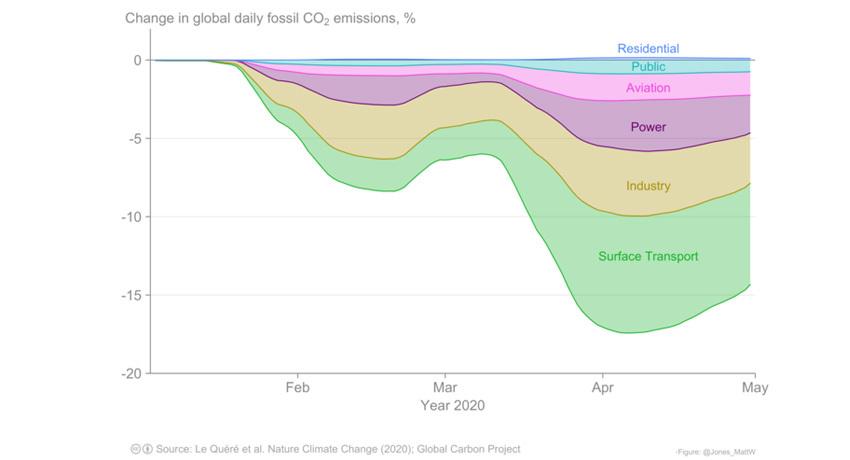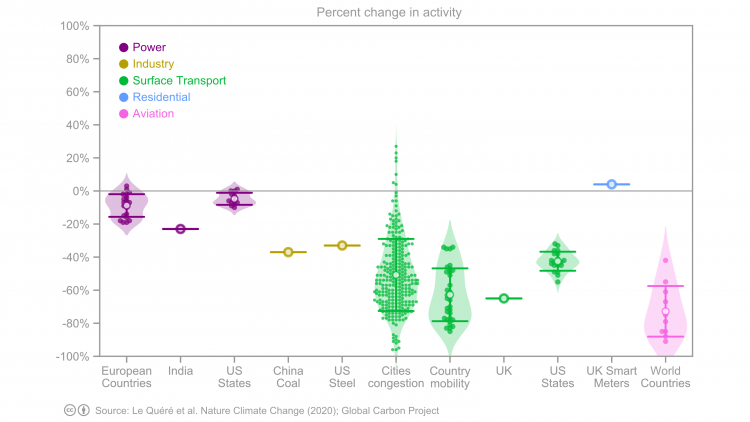A study led by 4C scientists estimates a 17% decrease in CO2 emissions at the peak of the COVID-19 forced confinement. However, this temporary decrease in emissions cannot be sustained without structural changes in the economic recovery policies.
Confinement measures have been adopted by many nations around the world since the beginning of 2020 in an attempt to contain the spread of COVID-19. With a great part of the world’s population forced to stay at home, these measures have brought about drastic changes in energy demand, transport and consumption patterns.
A recent study led by 4C scientists Corinne Le Quéré and Anthony De-Gol (University of East Anglia), Glen P. Peters and Robbie M. Andrew (CICERO), and Pierre Friedlingstein (University of Exeter), along with other lead scientists in the field, explored the impact of the COVID-19 forced confinement on daily CO2 emissions. The study published in Nature Climate Change estimated the CO2 emissions between January and April 2020 in 69 countries, which represent 85% of the world’s population and 97% of global CO2 emissions.
Currently, CO2 emissions are not monitored in real time, despite the importance of such data for understanding the impacts of climate change, and devising effective policies to reach the Paris Agreement goals. Even annual emissions are often reported with a delay of months or years. Obtaining real-time data on anthropogenic emissions is challenging due to the natural variability of the carbon cycle, as well as uncertainties in satellite measurements.
In order to determine the COVID-19-induced changes in emissions, the 4C researchers estimated daily emissions based on the extent of the confinement policies in each country (termed the ‘confinement index’) in combination with activity data in six economic sectors. The power, industry, surface transport, public, residential and aviation sectors were assessed, which account for over 95% of global emissions. The study reports a reduction in anthropogenic emissions by 1,048 MtCO2 (range, -543 to -1,638 MtCO2) for January-April 2020, compared to the 2019 emissions for the same period.
In early April, the daily CO2 emissions were comparable to the 2006 levels. At the peak of the confinement, daily emissions dropped by 17% compared to the 2019 levels (value estimated for 7 April 2020), with a maximum decrease by 26% in individual countries. The aviation and surface transport sectors saw the greatest decline in emissions, with a small increase of 5% reported in residential emissions.
There is still uncertainty over the duration of the confinement and the overall impact on the CO2 emissions in 2020. The study further estimated that the total drop in annual emissions will be in the range of 4-7%, depending on whether pre-pandemic activity will return by mid-June or if some measures will remain in place until the end of the year.
Nevertheless, the impressive drop in emissions by 1,048 MtCO2 in January-April 2019 is extremely small compared to the total quantity of CO2 emitted as a result of human activities so far, which exceeds 1,000,000 MtCO2, as commented by Professor Corinne Le Quéré (University of East Anglia, UK), the paper’s lead author and 4C researcher.
Since greenhouse gases reside in the atmosphere for long periods of time, CO2 concentrations are expected to continue to increase at a relatively stable rate despite the temporary shift in emissions driven by COVID-19 measures.
Overall, the drop in emissions seen in 2020 is expected to be in line with the annual reduction needed to keep global warming below 1.5°C (according to the Paris Agreement), although these emissions are likely to return to pre-pandemic levels later in 2020. This highlights the need for policies supporting structural changes in energy, surface transport and consumption patterns. The turn to a low-carbon economy is crucial to sustain long-term reductions in CO2 emissions.
While planning economic stimulus packages in response to the COVID-19 crisis, new Green Deals must stay at the top of the political agenda. “The extent to which world leaders consider the net zero emission targets and the imperatives of climate change when planning their economic responses to COVID-19 is likely to influence the pathway of CO2 emissions for decades to come”, the study concludes.
The 4C project aspires to provide key knowledge on climate-carbon interactions and feedbacks, and robust annual to decadal predictions of the carbon cycle. This knowledge will allow for better-informed policy- and decision-making for a sustained decrease in CO2 emissions.
Study: Corinne Le Quéré, Robert B. Jackson, Matthew W. Jones, Adam J. P. Smith, Sam Abernethy, Robbie M. Andrew, Anthony J. De-Gol, David R. Willis, Yuli Shan, Josep G. Canadell, Pierre Friedlingstein, Felix Creutzig and Glen P. Peters (2020). Temporary reduction in daily global CO2 emissions during the COVID-19 forced confinement. Nature Climate Change. DOI: 10.1038/s41558-020-0797-x.
Written by Andria Nicodemou (BSC).
- Log in to post comments


